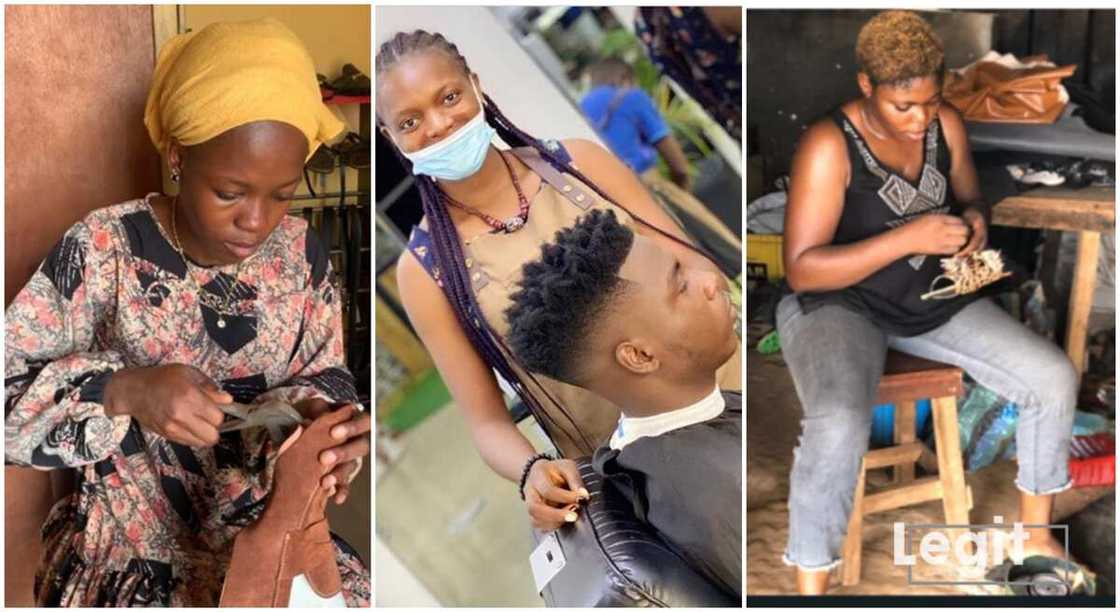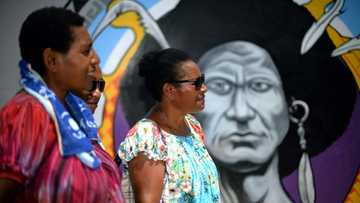Breaking barriers: How Ladies are Making Waves in Male-dominated Professions
It is an established fact that women find it harder to enter some professions than men. Some professions are considered no-go-areas for women even when they are fully qualified to be given a chance.
PAY ATTENTION: Click “See First” under the “Following” tab to see Legit.ng News on your Facebook News Feed!
Gender roles, family background as well as societal pressure combine to stifle the professional preferences of women. Many times, women tend to settle for less.

Source: Original
Why does society think women cannot fit into certain professions such as engineering? Ester Ijewere, a Nigerian gender activist profers some answers:
"It’s the socio-cultural perception that women can’t do better than their male counterparts in those professions because they are vulnerable. This preference is heavily influenced by socio-economic constraints and pressure to conform to traditional gender roles.
"Numerous explanations have been offered for this discrepancy, including a lack of mentorship for women in the field. The society feels it’s hard for female engineers to maintain a balance between work and family life. While this is obvious, we’ve also seen a paradigm shift in recent times and women are beginning to break boundaries, while creating healthy work-life -balance."
PAY ATTENTION: Subscribe to Digital Talk newsletter to receive must-know business stories and succeed BIG!
In a February 2022 publication, the International Labour Organisation is worried that women around the world find it hard to get employed. When they are given a chance, the jobs according to ILO are of lower quality.
According to ILO:
"The current global labour force participation rate for women is just under 47%. For men, it’s 72%. That’s a difference of 25 percentage points, with some regions facing a gap of more than 50 percentage points."
Women barred from certain jobs and crafts
In a publication aptly titled "Remove the Barriers" UN Women laments that only 67 countries have laws against gender discrimination in workplaces and in 18 countries husbands can legally prevent their wives from working.
The body laments:
"In every country around the world women face multiple barriers and gender-based discrimination in the work place. These obstacles make it harder for women to get on an equal footing with men in the world of work."
29.9% of Nigerian women declared as housewives
In Nigeria, the case is not different and is even more challenging for women. Data published in 2020 by Statista show that only 9.5% of Nigerian women are skilled artisans, whereas, 29.9% are housewives or homemakers.
This shows that women are still facing enormous challenges entering certain professions and some have even given up and settled full-time where society has placed them.
Because of societal pressure and family upbringing, some women simply see no need to fight to live their dreams, so they give up.
How Nigerian women are taking up male-dominated professions
Yet, grim as the situation is for women, there are a few of them forcefully breaking the barriers thrown at them by society.
A number of them are now taking up male-dominated professions and doing very well in them.
Many have become barbers, shoemakers, even after getting a higher education and they are often seen as torchbearers in the struggle for gender equality in professional settings.

Read also
"She's more than ready": Many commend Tonto Dikeh as she talks about becoming deputy governor of Rivers state
Precious Joseph refuses to give up, becomes a barber
Precious Joseph, an enthusiastic young lady set out to be a soldier. She has always wanted to be unique, so it was easy choosing military service.
Precious obtained the forms and passed all the screening that was required of her as potential military personnel. She may have had good dreams of what life she was going to have in the Nigerian Army.
But that was not going to be because her family kicked against her desire to be a soldier, insisting that she is the only girl in the house. Precious had to listen to them and find something else to do with her life.
Instead of giving up on her quest to settle for a unique profession, Precious took up barbing. She took time to learn and horn her craft under an already established master. She spoke of how her journey in the male-dominated profession began in an interview with Legit.ng:
"My journey started 2014. Then I was still contemplating on joining the military or learning a skill. Being the only girl. My family was against me joining the military even after I passed the screening.
"So I’m like if I can’t be a soldier I should be able to learn a skill I can be dedicated to. I have worked with a few barbershops before starting mine. I opened my own salon last year in December."
Not only is Precious now living her dreams, but she also said she intends to acquire more education now that she has established her own shop. Her shop is in Ajah, Lagos.
11-year-old Elizabeth Akintoba shuns feminine jobs, takes up barbing as a chosen profession
Just like Precious, 11-year-old Elizabeth Akintoba has chosen barbing as what she wants to do for the rest of her life.
One would wonder where Elizabeth found the courage to venture into a male-dominated field at such a young age, but she has not minced words about how happy she is in her chosen career. Her courage as a girl and her overall outspokenness about what she wants have often wowed observers.

Read also
Taraji P. Henson discloses she's considering relocating from America: "I quit, I'm tired of fighting"
Elizabeth spoke passionately about her chosen field:
“As I have discovered barbing, my future is already set because I have a handiwork. I am always looking forward to coming to the salon because it is an opportunity for me to learn and to put what I learnt into practice.”
For Elizabeth, being a barber is a dream she has had as a kid. It just happened that a program was held in Ajegungle and the focus was discovering female barbers. One of the resource persons who is herself a female barber picked interest in Elizabeth due to her keen attention to detail.
That was how she came to become an apprentice and a possible star in the male-dominated field of barbing.
Not always that easy for other girls such as Yetunde who was rejected when she went to learn shoemaking
But it would have been easier if other girl children have it as easy as Elizabeth when they want to enter professions dominated by men. If rejection and discouragement does not come from kit and kin, it comes from outsiders.
Unlike Elizabeth, another Nigerian lady called Yetunde Odewumi had it tough entering the shoemaking profession.
Yetunde, a graduate of Transport Management from the Ladoke Akintola University of Technology, Ogbomoso, said she made up her mind she wanted to be a shoemaker. But making up her mind was an easy task, the more difficult one was finding where to learn the craft.
The first place she went to learn rejected her, citing the fact that she is a female as the sole reason. But having made up her mind, the determined lady had to search for another place to learn.
Yetunde narrated her experience to Legit.ng in an interview:
"The first shoemaker I went to meet in my area then rejected me politely based on they don’t take female apprentices in his unit.
"And in fact, I just wanted to learn female slippers and sandals, so I tried to persuade him to help him speak to their chairman because of the nearness to my house then.

Read also
So bold: Nigerian lady who rejected big US admission gets the recognition of American government 8 years later
"After some days he got back to me that’s it’s still no, and he said there are units that take females I should go there. That was what made me find a better place to learn."
Yetund's mind was already made up. It is actually this kind of bullish attitude that make ladies to break barriers where men are dominating. She moved on and actually learned the craft and became amazing in it.
She said:
"Initially, I started with bag making; Ankara bags to be precise, then I went for an advanced class and proceeded to make leather bags. It was one of my customers that requested for a matching shoe for her bag that made me go for the shoemaking training."
Yetunde now owns her own shoe brand named Mahmah.
Sharon Ijuolachi Akpa goes the extra mile to shine brighter in male-dominated world of shoemaking
There is another lady who has taken the male-dominated craft of shoe making by storm. Her name is Sharon Ijuolachi Akpa and she has been severally cited as an example of what women can do with bullish determination.

Read also
Is schooling in Nigeria really a scam? A cursory look through the lens of promising Nigerian graduates
Started out in 2017 from a roadside shop, Sharon, popularly called Ada Ebonyi has now expanded so much so that she has opened a school to teach even men how to make shoes. Many have called her the real definition of a barrier breaker.
Many are wondering how she made money to open her shoe-making school as a lady. Legit.ng posed this question to Sharon and here was how she responded:
"I saved the money for the school basically from my shoemaking retailing business. I didn’t expect the school to take up so much money. I almost gave up at a point, from buying foams for the hostels, machines, tools, even the tools I ordered from China didn’t come in before the opening, I had to buy the tools again here."
The future of women in male-dominated fields
There are those who contend that for women to fully make a real impact in male-dominated fields, they really need to start by taking the bull by the horn and stop waiting.

Read also
From maid to Colombia’s first black vice president: All you need to know about beautiful Francia Marquez
Women really need to go out of their way to achieve their dreams without having to pander much to their male counterparts.
Also, the government of the day needs to deliberately make laws that protect the rights of women who want to pursue certain professions considered to be exclusive to males.
Moving forward, Ester Ijewere, the Nigerian gender activist advises on what should be done to help women feel empowered when they want to go into certain professions. She also spoke on what she thinks is the reason for low self-esteem among women.
She said:
"I realized that the problem starts from the home, a lot of women were raised to think they have limitations professionally and they are more useful at home than in professional settings. When I come across such women, I help build their confidence by sharing stories of women who have excelled in those professional settings.

Read also
"I've been bullied since I was 11, people compare me to animals": Monalisa Stephen opens up on struggles
"Support the girl child from an early age, help build her confidence and don’t let her feel she is less to her male counterpart. When a girl child is raised with love and attention, she carries that energy into the world as an adult because her parents already prepared her for the task ahead."
Source: Legit.ng






